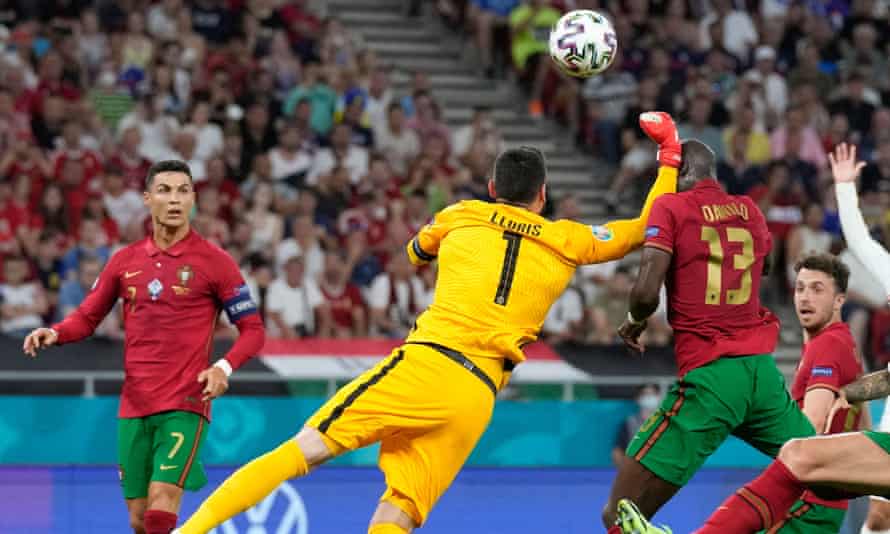Euro 2020’s concussion controversy started with Benjamin Pavard. The France full-back said he had been “a little knocked out” after a collision with Germany’s Robin Gosens, but he played the remaining half an hour of his team’s 1-0 victory. Six days later and it was Christoph Baumgartner of Austria who received a blow to the head, went back on the pitch, scored a goal and was then substituted, his coach admitting the 21-year-old had been experiencing dizziness.
Then, on Wednesday, in the final round of group matches, came the third incident: the France goalkeeper, Hugo Lloris, in effect threw a straight right hand at Danilo’s jaw in mid-air. The Portuguese midfielder collapsed to the ground, his eyes spinning in his head, but was cleared to play on. At half-time, he, too, was withdrawn.
Just before the start of the tournament Uefa confirmed it would be applying a new focus on concussion. The protocol would insist on players being removed from the pitch if concussion was even suspected. It was, Uefa said: “A further step towards protecting the health of players.”
You might be forgiven for asking quite what has happened to that approach.
After Pavard’s injury, Uefa said it had consulted with France’s team doctor, who told them he “did not find any reason to suspect a concussion”. Uefa concluded, as a result, that the protocol had been followed.
After the Baumgartner injury, Uefa said it had been in touch with the Austrian medical team and “received a satisfactory report … that there were [and still are] no signs of a concussion”.
Following Danilo’s injury, Uefa told the Observer the player had suffered “a mild head trauma” and that the immediate assessment did not trigger red flags but that he suffered discomfort at half-time and was substituted as a precaution.
George Chiampas is the chief medical officer at US Soccer and also sits on Fifa’s medical committee. He describes Pavard’s and Baumgartner’s injuries as “very clear and obvious” concussions. “From a Fifa perspective, we’re trying to provide the physicians, the referees and the staff with all the tools they need to be able to identify [concussion].
“We know that physicians on the bench may not have the ability to see everything, we have the responsibility to provide them with the information. [But] in these examples, where it’s clear and obvious that the two individuals were concussed, that’s where we have a big, big problem. We can’t miss those. We can’t make those sort of mistakes.”
According to Luke Griggs, deputy chief executive at the brain injury charity Headway, the Euros have seen “a number of incidents that are at best questionable and at worst entirely inappropriate”.
Headway is an outspoken critic of the way football deals with concussion and for Griggs the failings at the championship are representative of a broader problem.
“Ultimately, we have a new concussion charter based on principles already enshrined in existing protocols,” he says. “They all clearly state that if a player is suspected of concussion they must be removed from the field of play. But team doctors are placed in an impossible position of being asked to make a concussion assessment in two-to-three minutes under the gaze of the players, the media and the watching fans.
“You also see referees urging the medics to get off the pitch. You’re never going to get an accurate assessment over whether a concussion has actually occurred.”

Griggs and Chiampas believe the way head injuries have been dealt with at the Euros highlight the need for broader cultural change. The first is about information, making it easier for a doctor to make as informed a decision as possible.
An easy win in this field would be the addition of concussion spotters; people sitting in the stands watching only for head injuries and relaying what they have seen to the doctors. The knowledge for such a role is not highly specialised, a steward, say, could be trained into the role. Spotters are to appear at next year’s World Cup for the first time.
The second change is about time, giving doctors the room to make proper decisions. That is harder. Chiampas and Griggs are advocates for temporary concussion substitutes. The change allows the game to continue while an assessment is made and the time provided takes the pressure out of it. An international body, the Concussion in Sport Group, says its test for concussion “cannot be performed correctly in less than 10 minutes”.
The global game is taking a different path, however, and, under the auspices of the law-making International Football Association Board, permanent substitutes are being trialled. The FA’s chief executive, Mark Bullingham, who has implemented the trial in the FA Cup, makes the same argument from the opposite point of view: that permanent substitutes cut out the false negatives from assessments conducted in a time-limited window.
Chiampas says a reset of attitudes is needed, one that makes it acceptable to stop the game to perform the assessment, whether or not a substitution is made. He suggests this can be done with signals: the assistant referee should “drop an orange flag”, a sign that can be seen by everyone that says “an individual is concussed and we are making the decision to support the clinicians”.
What the evidence of the Euros seems to show, however, is that, for whatever reasons, be it competitive instinct, professional obsession or maybe even commercial imperative, clinicians are not being supported in the way that they should.
“Of fundamental concern,” says Griggs, “is this apparent message from Uefa, Fifa and Ifab that concussion is a minor irritation to be addressed by a few pieces of paper. But these pieces of paper are meaningless unless they are backed up by actions. Action that put players’ safety first and foremost.”
from Football | The Guardian https://ift.tt/3jfR21T
via IFTTT

No Comment